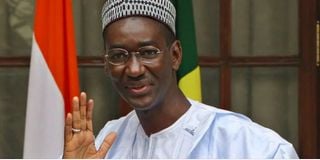Premium
Mali's interim PM Moctar Ouane to form new government

Mali's Prime Minister Moctar Ouane resigned and was reinstated on May 14, 2021 in order to form a new government.
Mali's interim government is set to form a new "broad-based" cabinet, the presidency said on Friday, amid growing criticism of the army-dominated authorities in the Sahel state.
Prime Minister Moctar Ouane resigned Friday but was immediately reappointed in order to carry out the reshuffle, according to a tweet from the office of the interim president.
"The prime minister has just started consultations," said an advisor to the interim president who declined to be named. "He must form a broad-based government".
Ouane was named prime minister after military officers in August ousted the elected president Ibrahim Boubacar Keita, who was under pressure for his handling of Mali's jihadist insurgency.
Under the threat of international sanctions, the military handed power between September and October to a caretaker government, which pledged to reform the constitution and stage elections within 18 months.
But figures with army links dominate this body, and there is growing anger about their prominent role and the slowness of reforms.
'More law-abiding'
The opposition M5 movement last week called for the dissolution of the transitional government and demanded "a more law-abiding and more legitimate" body.
The Economic Community of West African States (Ecowas) mediator for Mali, former Nigerian president Goodluck Jonathan, also warned last week that there was little time left to complete the reforms.
Last month, Mali's interim government announced that it would hold a constitutional referendum on October 31, with elections to follow in February next year.
But conflict and political contestation in the landlocked nation of 19 million people has left some doubting whether the authorities will stick to schedule.
Mali is struggling to quell a brutal Islamist insurgency which first emerged in northern Mali in 2012, before spreading to the centre of the country as well as neighbouring Burkina Faso and Niger.
The country is also wracked by civil-society disputes. For example, the country's largest union, UNTM, is threatening a four-day strike from next week over salary issues among other things, according to local press reports.





